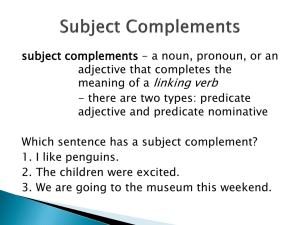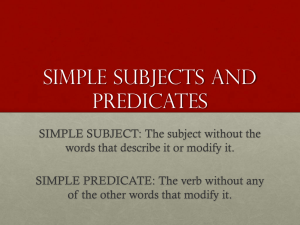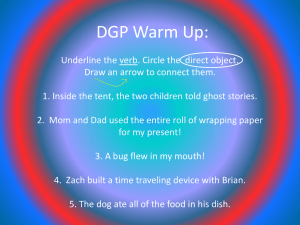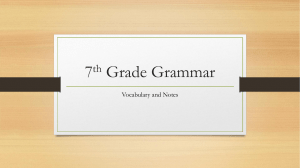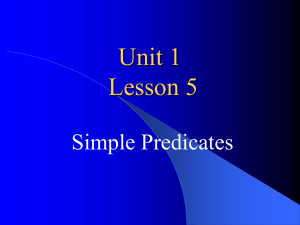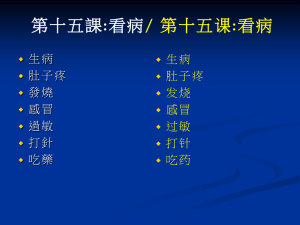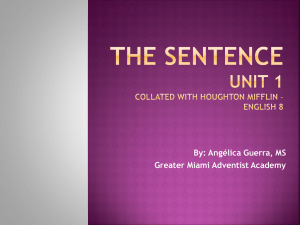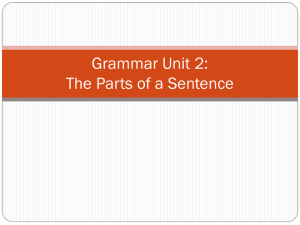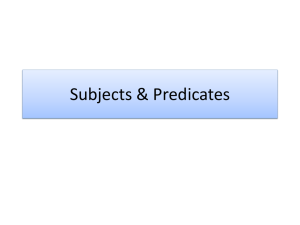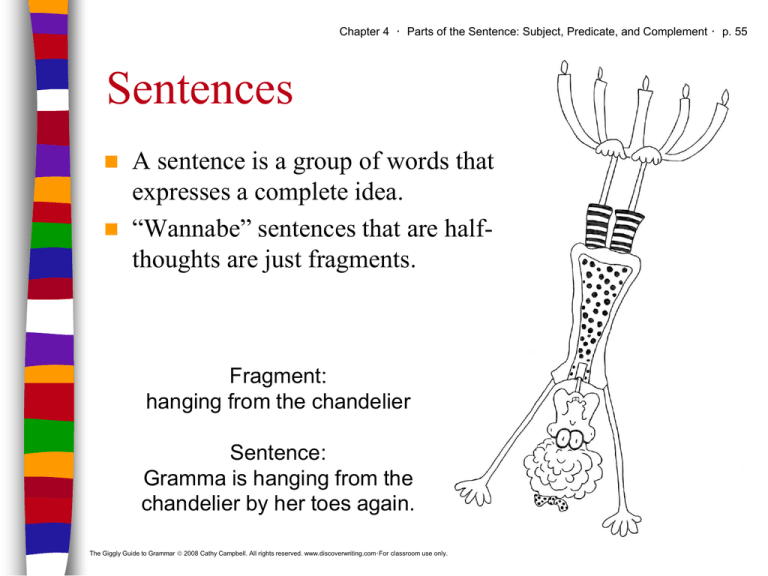
Chapter 4 ・ Parts of the Sentence: Subject, Predicate, and Complement ・ p. 55
Sentences
A sentence is a group of words that
expresses a complete idea.
“Wannabe” sentences that are halfthoughts are just fragments.
Fragment:
hanging from the chandelier
Sentence:
Gramma is hanging from the
chandelier by her toes again.
The Giggly Guide to Grammar 2008 Cathy Campbell. All rights reserved. www.discoverwriting.com・For classroom use only.
Chapter 4 ・ Parts of the Sentence: Subject, Predicate, and Complement ・ p. 56
Subject
The person, place, thing or idea that’s the main focus of a
sentence is called the subject. Sometimes the subject can
be more than one word.
What’s the subject
of this sentence?
On bad hair days, Matilda, a
fashionable young lady, wears colorful,
eye-catching shower caps to hide her
trussed up tresses.
The Giggly Guide to Grammar 2008 Cathy Campbell. All rights reserved. www.discoverwriting.com・For classroom use only.
Chapter 4 ・ Parts of the Sentence: Subject, Predicate, and Complement ・ p. 62
Compound Subject
A sentence about more than one person, place, thing or
idea has a compound subject.
Who are the subjects
of this sentence?
Ernie, Prudence, their
goldfish and dog Spot chew
bubblegum.
The Giggly Guide to Grammar 2008 Cathy Campbell. All rights reserved. www.discoverwriting.com・For classroom use only.
Chapter 4 ・ Parts of the Sentence: Subject, Predicate, and Complement ・ p. 63
Predicates
Every sentence needs a predicate, a verb. A simple
predicate is just the verb, a complete predicate is the
verb and all the words and phrases that go with it.
A predicate tells what the subject is doing or what’s
being said about it.
Ramona reads mystery stories by
the light of her ponderous firefly.
What is the simple predicate?
What is the complete predicate?
The Giggly Guide to Grammar 2008 Cathy Campbell. All rights reserved. www.discoverwriting.com・For classroom use only.
Chapter 4 ・ Parts of the Sentence: Subject, Predicate, and Complement ・ p. 65
Complements
Sometimes a subject and predicate need a word to fully
complete the meaning of a sentence. This word is called
a complement.
What word completes
the sentence?
This word is the
complement.
Fido found a bone.
The Giggly Guide to Grammar 2008 Cathy Campbell. All rights reserved. www.discoverwriting.com・For classroom use only.
Chapter 4 ・ Parts of the Sentence: Subject, Predicate, and Complement ・ p. 66
Direct Objects
A direct object is always a noun or
pronoun that comes after the action
verb. It receives the action of the verb,
so ask whom or what after the verb to
find the direct object.
Whom or what did
Thadeus compliment?
Thadeus complimented
Nadine on her new
Tyrannosaurus earrings.
The Giggly Guide to Grammar 2008 Cathy Campbell. All rights reserved. www.discoverwriting.com・For classroom use only.
Chapter 4 ・ Parts of the Sentence: Subject, Predicate, and Complement ・ p. 68
Indirect Objects
Some sentences have indirect objects.
An indirect object comes before the
direct object and is always a noun or
pronoun. Find the direct object and then
ask to whom, for whom, to what or for
what about the direct object to find the
indirect object.
Find the direct objects in this sentence.
Wyonna taught her hamster and
garden snake a song and tap
dance from a hit Broadway show.
The Giggly Guide to Grammar 2008 Cathy Campbell. All rights reserved. www.discoverwriting.com・For classroom use only.
Chapter 4 ・ Parts of the Sentence: Subject, Predicate, and Complement ・ p. 69
Predicate Nominative and Adjective
Subject complements only come after linking verbs. There
are two types. The predicate nominative is a noun or
pronoun that follows a linking verb. A predicate adjective
is an adjective following the linking verb.
Which sentence has a predicate nominative and which sentence has
a predicate adjective?
Gromer’s best friend is his
pet eggplant.
The Giggly Guide to Grammar 2008 Cathy Campbell. All rights reserved. www.discoverwriting.com・For classroom use only.
The hair on Puddington’s
three headed cat looks straggly.

